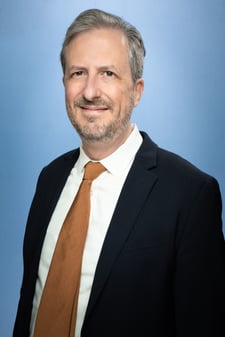.png) Introducing Edward “Ted” Huey, MD Director of the Memory and Aging Program at Butler Hospital"
class="bg-img"
fetchpriority="high"
loading="eager"
decoding="async">
Introducing Edward “Ted” Huey, MD Director of the Memory and Aging Program at Butler Hospital"
class="bg-img"
fetchpriority="high"
loading="eager"
decoding="async">

On February 1, 2023, a new director took the helm at the Memory and Aging Program (MAP) at Butler Hospital. Edward (“Ted”) D. Huey, MD brings extensive experience in clinical research and clinical trials to the role, along with great compassion and an energetic, inquisitive, and collaborative spirit.
Dr. Huey is a distinguished physician-scientist. He comes to Butler Hospital and Brown University from Columbia University. While there, he served as director of the Frontotemporal Dementia Center and as an associate professor of psychiatry and neurology at the Taub Institute for Research on Alzheimer’s Disease (AD) and the Aging Brain. He also led the Columbia Alzheimer’s Disease Research Center Outreach, Recruitment, and Education Core and was the medical director of Columbia’s Huntington’s Disease Society of America Center of Excellence.
Dr. Huey’s research has focused on patients with Alzheimer’s disease (AD), frontotemporal lobar degeneration (FTLD), and related disorders. He has a particular interest in the causes, assessment, and treatment of behavioral and neuropsychiatric symptoms in neurodegenerative disorders including AD, FTLD, and Huntington’s disease.
With his extensive experience in clinical research and clinical trials, Dr. Huey is well-prepared to lead the ongoing and future groundbreaking studies conducted here at the Memory and Aging Program and foster collaboration and innovation across Brown’s Division of Biology and Medicine, the Carney Institute for Brain Science, and the Center for Alzheimer’s Disease Research.
Research and clinical care for AD and related dementias are critically important. Dr. Huey shares some of his thoughts about the field, his goals for the program, and his new role and home here in Rhode Island at Butler Hospital and Brown University.
The enormity of the problem has always struck me. Those of us who [treat] older patients know that cognitive issues and dementia are such dominant issues for them. Not only for those who are affected but also for older people, in general, because it’s a constant worry as people age, even more so than many other disorders or diseases.
On top of that, the prevalence of these conditions is so high, and the treatments have been insufficient up until this point. But there’s a lot happening in the field right now, especially in terms of new developments in earlier detection and disease-modifying treatments and that’s one thing that’s really on our side. Because, even if we don’t yet have an absolute cure, if you can delay the onset of symptoms by a few years or even a decade and then slow the progression of those symptoms for years after that, given the older age that most people develop those first symptoms, for many people that can start to approach a cure. So that’s interesting to me from both a scientific and clinical point of view.
I’m also very excited about helping to bring along the next generation of physicians and scientists. I’ve always said to people thinking about going into this field how dynamic and rewarding it is. The people we attract to this field and how we train them to do good, ethical clinical research is what will influence what comes next in the fight against Alzheimer’s and other brain disorders.
A lot of it was the excellence of the work that’s done here. The fact that [Stephen Salloway, MD, MS] founded the program and headed it so well for more than 20 years was a big draw, along with the fact that the staff there has built an internationally known and well-regarded clinical research program.
MAP has been involved in many seminal AD studies right from the outset and has done an exemplary job of contributing to the field. Not only that, but the program has a long history of training the next generation of researchers in that tradition of excellence, and it’s a team that really works well together, which is a pleasure to behold. I want to acknowledge and learn from all that’s been done here already, and to come in and have that all be there and ready to build upon is incredible.
It’s an exciting time. We have the first disease-modifying treatments being discovered and coming online, but there’s still a tremendous amount of work to do in that area. We’re so incredibly well set up to do that kind of work here, though, so I think MAP is going to be a very important center in answering all these central questions over the next decade.
I’m excited to be part of the “BioFinder” Brown study, which is looking at the possibility of a blood test that can give you a sense of risk for Alzheimer’s. But, once you have that, how do you help PCPs interpret that, and what comes next? Figuring out how that screening is going to look in the primary care setting is going to be important.
Dr. Louisa Thompson is already doing a great job of integrating cognitive testing in primary care through her study here at MAP, and I’ve done a lot of work previously that involved informing people about hereditary genetic disorders and how to best go about that, so I think we’re on track to play a significant role in helping to solve those important questions.
Another particular interest of mine is the non-cognitive symptoms of neurodegenerative diseases – things such as changes in sleep patterns, appetite, and mood. Those symptoms really interfere with quality of life and need to be addressed as well. I think that’s an underdeveloped field but one that we could make considerable advances in over the next decade.
Lastly, I’m very interested in gaining a better understanding of how Alzheimer’s and non-Alzheimer’s dementias overlap and comparing and contrasting them. There are a lot of fascinating little puzzles in that regard. For example, tau pathology is in AD as well as FTD, but we don’t yet understand why. The other pathology of FTD is TDP-43, and we’re now coming to find that it occurs quite a bit in AD as well. Vascular disease is another factor – studying how that can trigger amyloid to develop, and how those diseases interact in interesting ways.
So, we’re quickly learning that dementia is more complicated than ever thought. And I think a lot of that’s going to be fleshed out in the next 10 to 15 years because researchers working on all these conditions are discovering that we have the same goal, which is instead of looking at one specific disease, to look at diseases of the brain based on the root causes. Having a better understanding of what’s happening in the brain will allow for more targeted, personalized treatments based on the condition.

Well, my family and I are still in the process of getting settled here in Providence, but we think it’s such a beautiful place. My wife was recruited to work at Massachusetts General Hospital in Boston. She trained in geriatrics and palliative care, so now she’s working at MGH to improve geriatrics and palliative care there, system-wide. We had the conversation of where to live, Boston or Providence, and ultimately we chose Providence because it offers such a good quality of life for our family – we have two teenage girls. We really love it so far and feel like we’ve made the right decision.
Disclaimer: The content in this blog is for informational and educational purposes only and should not serve as medical advice, consultation, or diagnosis. If you have a medical concern, please consult your healthcare provider or seek immediate medical treatment.
Copyright © 2026 Care New England Health System